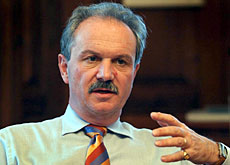Trade unions call for pay rise

The Swiss Employers’ Association has reacted cautiously to trade union demands for a general salary increase of up to 3.5 per cent.
The calls come as economic indicators predict that Switzerland will enjoy a period of solid growth and low inflation in the second half of the year.
Last week the Swiss Institute for Business Cycle Research forecast that the rise in exports of goods and services should continue until at least the end of this year.
Zurich Cantonal Bank has predicted growth of 2.1 per cent for 2004 – 0.1 per cent higher than the Swiss National Bank’s own forecast.
Bright outlook
“The economic climate for salary increases is clearly better than it was one year ago,” said Pietro Cavadini, spokesman for the Swiss Federation of Trade Unions.
Cavadini said the federation would spell out its demands on August 11, adding that they would be based on productivity levels in various sectors of the economy.
The calls from the unions come at a time when the jobless rate in Switzerland is on the decline.
Unemployment has fallen for four months in a row and currently stands at 3.8 per cent.
Various demands
The union representing workers in the construction industry is calling for a general salary rise of between two and 3.5 per cent.
Representatives of employees in the chemical industry are demanding an increase of three per cent and an annual rise in basic salaries of at least SFr800 ($624).
Bruno Schmucki, spokesman for the union of employees in the industrial and services sector, wants to see companies agree to a minimum wage of SFr3,700.
“People with low-paid jobs have experienced a loss in purchasing power,” Schmucki told swissinfo.
“But employees on middle incomes are in need of a pay rise as well, to further stimulate growth,” he added.
Individual firms
Responding to the demands, the Swiss Employers’ Association said it was ruling out general salary increases for entire sectors, adding that pay rises were a matter for individual companies.
The State Secretariat for Economic Affairs (Seco) is of the same opinion, but says it would welcome increases in basic salaries for some of the lowest-paid jobs.
“It’s also important that other issues such as further education are part of the salary negotiations,” said Jean-Luc Nordmann, head of Seco’s labour division.
Between 2001 and 2003, employees in Switzerland received pay rises of about one per cent, after inflation is taken into account.
Purchasing power
Some experts doubt that any rise in salaries negotiated between unions and employers for 2005 will amount to more purchasing power for Swiss households.
According to Credit Suisse, around 35 per cent of an average Swiss family’s income is eaten up by insurance and taxes.
Switzerland’s second-largest bank predicts that this is likely to rise still further in future.
Health insurance premiums alone are forecast to rise by about five per cent next year.
swissinfo with agencies
The Swiss economy is expected to grow by about two per cent in 2004.
Growth is being driven by exports of Swiss goods and services.
Unemployment stands at 3.8 per cent.

In compliance with the JTI standards
More: SWI swissinfo.ch certified by the Journalism Trust Initiative










You can find an overview of ongoing debates with our journalists here . Please join us!
If you want to start a conversation about a topic raised in this article or want to report factual errors, email us at english@swissinfo.ch.